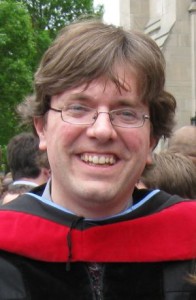I just started reading The Open Source Church yesterday – pretty timely to find this book after completing my thesis The Open Source Lectionary. “Open source” is definitely in the air. One of the points author Landon Whitsitt makes well is the free nature of the Gospel: the Good News of Jesus Christ is free and sets all free. You cannot put a price on the Good News. You give it away for free – or rather, God gives it away for free, and we pass it on, freely and openly. Whitsitt re-imagines the church through the lens of the open source concept: what is a church like where everyone is free to share Jesus in any way to any one at any time, with the only limits being the basic boundaries of Christian faith and loving action?
Ironically, yesterday I also received some literature from the International Association of Scientologists. No, I am not interested in Scientology; I don’t know how I got on their mailing list. I know so little about the organization/religion that I will not here critique it, but simply note two points based on the material I received. First, Scientology is very much focused on knowledge. It feels rather Gnostic, with a standard set of books and recorded lectures by their founder, science fiction writer L. Ron Hubbard, which Scientologists are expected to read and master. In their “Churches,” Scientologists have “course rooms” in which students are expected to “fly along with swift duplication and full comprehension” as they participate in “the Golden Age of Knowledge.” Scientologists advance along a set course of study and attain different levels “on the routes to knowledge.” An Ideal Org(anization), according to the material, “is a living representation of LRH and his legacy, with every function in place per policy, every post manned, every hat worn standardly.”
Now, the contrast with an Open Source Church could not be greater. I am not interested in knocking down a straw man, but simply noting that in Jesus’ beatitudes in Matthew 5, as well as the whole prophetic tradition, it is the poor, the oppressed, the marginal, who are blessed, not the possessors of knowledge. The Gospel is foolishness to the wise, says Paul. Following Jesus is not a matter of possessing secret knowledge but rather a relationship: not intellectual believing but relational beloving.
At the same time, there is something to be said for organized curricula of faith formation. In many Christian churches, Christian education virtually stops at the end of middle school. While I would never want to be stuck with a “closed source,” static curriculum of Christian education, there are biblical, theological, and practical basics that every Christian should have opportunities to explore – freely, openly, and communally.


